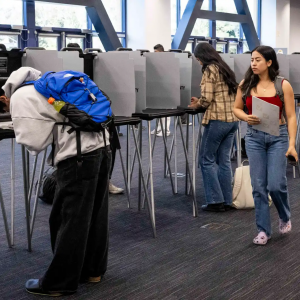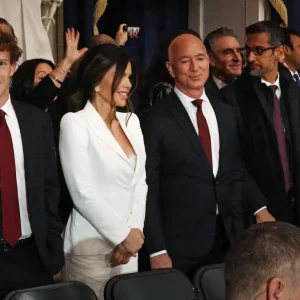As the election looms ever closer, Congressional Republicans found themselves between a rock and a hard place: a government shutdown, and the demands of their presidential nominee, Donald Trump. However, this conflict arose not just from Democrat-Republican relations, but internal party politics. Through the whole month of September, Republicans and Democrats debated amongst themselves on what should be included in the next government funding bill. The primary point of contention, mainly for Democrats, was the tying of the SAVE Act (which would require voters to produce government ID to be able to vote) to the continuing resolution. House Democrats supported a continuing resolution without the SAVE act, and during the attempts to pass a resolution, Trump insisted on pushing the SAVE Act through. Election security has been a cornerstone concern for the Trump campaign. Since his loss in the 2020 Presidential Election and the subsequent electoral fraud accusations and attempted insurrection, Trump has railed against voting by mail and other absentee measures, calling for more election security during the 2024 Presidential Elections. This rhetoric is supported by House Speaker Mike Johnson, who has also called for increased election security. But, with the slim Republican majority in the House and the amount of Republican holdouts, this became a hard bill to pass. Due to the SAVE Act’s inclusion, the original continuing resolution failed with a 202-220 vote, as Democrats almost unanimously voted against the bill. Trump and vice presidential candidate J.D. Vance has called for the SAVE Act to be passed at all costs, claiming that it would be preferable to have a government shutdown than to not have federal voter ID laws, despite the fact that it is illegal for noncitizens to vote in American elections. However, Johnson himself acknowledged that it would be a tough job to push the SAVE Act through the House. Despite several efforts to pass a continuing resolution with the SAVE Act included, Johnson was forced to remove the SAVE Act from the continuing resolution. This barebones continuing resolution ended up being passed in Congress, with congressional Democrats voting unanimously in favor.
While the controversy over the continuing resolutions seems to be focused between House Democrats and Republicans, what makes this incident much more interesting are the Republican holdouts, who have made passing a continuing resolution more challenging. These holdouts, including Florida Representative Matt Gaetz and Kentucky Representative Thomas Massie, primarily decided to pass on voting for the bill because of their stances on continuing resolutions in general. Others claimed that Johnson’s proposal was too much legislation bundled together. Some of them went so far as to not even vote in favor of the modified resolution. This highlights the Republican Party’s fiscal and cultural differences in positions. Obviously, some Republicans are more macroeconomically minded and are focused on government debt and spending. Massie, for example, believes that the continuing resolution would bloat the federal budget. But with the thin margins of voting, these few holdouts end up spelling disaster for heavily partisan legislation like the SAVE Act that is attached to continuing resolutions. This makes the Republicans look much more fractured to American voters, although the polling numbers do not reflect this overall. What they do reflect, however, is the American voters’ disapproval of Mike Johnson, with mid-September YouGov polling putting the congressman’s ratings at 42% unfavorable, 29% favorable. The state of affairs, where Johnson had to frantically call and negotiate with Republicans who did not support their own party’s proposal, clearly reflected the lack of confidence in Johnson’s ability to lead the congressional Republicans.
Another fascinating dynamic within the Republican party is the relationship between the current Republican presidential nominee, his vice presidential pick, and the Republicans in Congress. The SAVE Act is Trump’s out-of-office attempt at passing pointed legislation; Trump has long attacked voting authorities, famously claiming that the 2020 election was stolen and that Joe Biden was not the true victor. Voter ID laws have long been contentious across the United States and were especially prevalent in the Republican Party before the 2020 election. The Republican Party has pushed for voter ID laws, with a Republican Governor of Indiana signing a voter ID law into effect in 2007. Texas Attorney General Greg Abbott then created a program to crack down on voter fraud through coordination with Texas police departments in 2006 after a failed attempt to pass legislation on this issue. The Republican Party promotes voter ID laws as ways to prevent voter fraud, although critics view them as restrictions to voting, a criticism that can be extended to the SAVE Act. Vice presidential nominee Vance, even as the threat of government shutdown and its electoral consequences loomed over the Republican Party, claimed it was better to have a shutdown government rather than a “no[n] […] functioning government.” These sentiments were echoed by Trump, who posted on Truth Social that the most important thing for the American people is to guarantee election security. This criticism and push towards the SAVE Act highlights the fundamental differences between the Republican candidates and their congressional counterparts. Johnson is much more focused on what will help the overall Republican Party, given his focus on electoral strength and the detriment a government shutdown would have on the elections of congressional Republicans. For Johnson, the SAVE Act is not as important as staying in office and maintaining Republican control of the House, which the government shutdown would jeopardize. Trump and Vance, however, have a singular focus: the national election. On the national stage, it is much more important to focus on culture war and hardline rhetoric, which explains Trump’s and Vance’s calls for a government shutdown. Despite Johnson, Trump, and Vance all wanting the same thing, only Trump and Vance are laser-focused on highlighting a national political and cultural narrative about the presidential election.
Luckily for the Republicans, a government shutdown has been avoided until December. This pushes things further down the road to when Congress knows who will be in the Oval Office come 2025, and does not affect the re-election chances of Republicans. However, this whole debacle shows a party that is deeply divided, not in ideology, but in leadership. Johnson’s failure to rally his party has led to losses on Republicans’ major issues, and the schism between the goals of the Republican presidential candidates shows that party leadership is scattered.
Featured Image from AP News






Comments are closed.